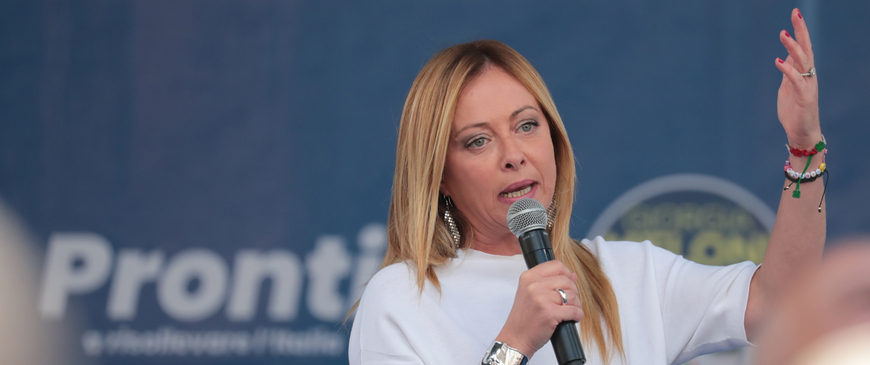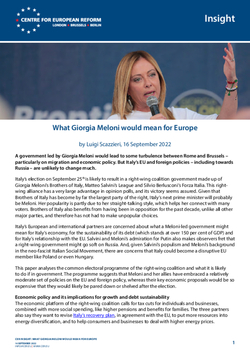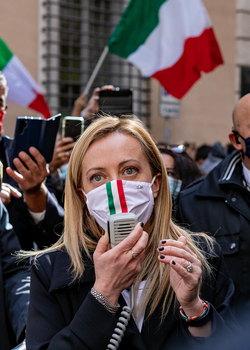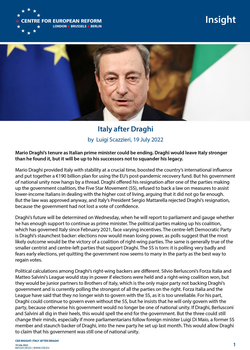
What Giorgia Meloni would mean for Europe
A government led by Giorgia Meloni would lead to some turbulence between Rome and Brussels – particularly on migration and economic policy. But Italy’s EU and foreign policies – including towards Russia – are unlikely to change much.
Italy’s election on September 25th is likely to result in a right-wing coalition government made up of Giorgia Meloni’s Brothers of Italy, Matteo Salvini’s League and Silvio Berlusconi’s Forza Italia. This right-wing alliance has a very large advantage in opinion polls, and its victory seems assured. Given that Brothers of Italy has become by far the largest party of the right, Italy’s next prime minister will probably be Meloni. Her popularity is partly due to her straight-talking style, which helps her connect with many voters. Brothers of Italy also benefits from having been in opposition for the past decade, unlike all other major parties, and therefore has not had to make unpopular choices.
Italy’s European and international partners are concerned about what a Meloni-led government might mean for Italy’s economy, for the sustainability of its debt (which stands at over 150 per cent of GDP) and for Italy’s relationship with the EU. Salvini and Meloni’s admiration for Putin also makes observers fret that a right-wing government might go soft on Russia. And, given Salvini’s populism and Meloni’s background in the neo-fascist Italian Social Movement, there are concerns that Italy could become a disruptive EU member like Poland or even Hungary.
Italy’s partners are concerned about what a Meloni-led government might mean for Italy's economy, for its relationship with the EU, and its foreign policy.
This paper analyses the common electoral programme of the right-wing coalition and what it is likely to do if in government. The programme suggests that Meloni and her allies have embraced a relatively moderate set of policies on the EU and foreign policy, whereas their key economic proposals would be so expensive that they would likely be pared down or shelved after the election.
Economic policy and its implications for growth and debt sustainability
The economic platform of the right-wing coalition calls for tax cuts for individuals and businesses, combined with more social spending, like higher pensions and benefits for families. The three partners also say they want to revise Italy’s recovery plan, in agreement with the EU, to put more resources into energy diversification, and to help consumers and businesses to deal with higher energy prices.
This programme would be expensive to implement, and a loose fiscal policy would lead to higher borrowing costs for Italy and perhaps a financial crisis. Meloni is aware of the risks of appearing spendthrift, and is trying to stress that she is fiscally responsible. The coalition is likely to choose a figure of some standing to be finance minister, to reassure partners and investors. A right-wing government would almost certainly scale back or scrap most of its spending promises. If it looked like it might implement them, Italy’s borrowing costs would shoot up amid market fears that the ECB could stop buying Italian bonds under its recently outlined transmission protection mechanism. This would prompt the government to step back from the brink.
A different question is whether a right-wing government would carry out the institutional reforms that Italy signed up to as part of its EU recovery plan, including reforming the justice system and the civil service to make them more effective. Former Prime Minister Mario Draghi started reforming both, but much work remains to be done to fully implement them. Because money from the EU’s Recovery Fund is disbursed in tranches and linked to meeting reform milestones, a right-wing government would have a strong incentive to continue with Draghi’s reforms. Even so, it may be difficult to meet all the targets, and there could be substantial disagreements between the Italian government and the European Commission over whether milestones have been met.
EU policy and its implications for the Union
Brothers of Italy and the League both have a eurosceptic outlook and have in the past toyed with the idea of leaving the euro. But the very first lines of the coalition programme make clear that they are committed to Italy’s membership of the EU and want to remain in the eurozone – and the programme even calls for a stronger Europe on the global stage. The programme does not mention policies that would quickly lead to a clash with the EU, and that some right-wing parties have adopted in the past, like asserting the supremacy of Italian law over EU law or giving Italian citizens privileged access to social services and benefits. Still, the programme clearly has a sovereigntist hue: it calls for a more assertive defence of Italy’s interests in the EU, and for an EU that is “more political and less bureaucratic”. There is little detail of how this can be achieved. But the programme does touch upon eurozone governance, energy and migration.
In terms of EU economic policy, the right-wing parties call for a revision of the EU’s growth and stability pact and for reform of European economic governance to ensure “stable and lasting growth and full employment”. In energy policy, the programme singles out the ecological transition as one of the key areas in which Italy’s national interests must be defended, but does not offer much detail on that. The EU policy area that the programme emphasises most is migration. The programme focuses on reducing the number of arrivals in Europe and for more co-operation with countries in North Africa – already the emphasis of EU policy. It also calls for EU-operated processing centres outside EU territory – an idea that French President Emmanuel Macron has championed in the past.
The right-wing parties will not seek confrontation with the EU. Still, there is likely to be some turbulence in relations, given their need to show that they are defending Italy’s national interests. In economic policy, Italy’s ambition for a looser fiscal framework is unlikely to materialise quickly, particularly if a right-wing government is seen to be fiscally irresponsible. It will also be difficult for the EU’s plans for a banking union to be completed, because the coming European recession will lead to more non-performing loans in Italy, further reducing hawkish countries’ willingness to share risks with Italy. When it comes to the EU’s green deal, a right-wing government in Italy seems likely to join the ranks of those EU governments that are less willing to commit to a quick reduction in emissions. But that does not mean that the EU’s green agenda will be wholly blocked: for example, Brothers of Italy has said that it supports the introduction of a carbon border adjustment mechanism.
As far as migration is concerned, there could be substantial disagreements between Italy and its EU partners. Salvini may well return to being interior minister and use that platform to enhance his political profile even if that means picking fights with EU partners. If the government has to abandon many of its economic policies, it may be even more tempted to pick fights over migration policy to show it is standing up for Italy’s interests. While the coalition programme does not mention the issue of burden-sharing with other member-states of the migrants arriving in Italy, it is difficult to imagine that a right-wing government would not push on this. Other European countries will continue to be unwilling to take in substantial numbers of migrants arriving in Italy. Far-reaching reforms of the EU’s half-built common asylum system will remain out of reach.
When it comes to the rule of law and EU institutional reform, a right-wing government in Italy could pose obstacles. A right-wing coalition would be soft on the EU's rule of law debate, and join the ranks of those member-states that are unwilling to push Poland and Hungary hard. And a right-wing government would not be enthusiastic about institutional reforms of the EU that appear to dilute national sovereignty, such as the extension of qualified majority voting in more policy areas, as proposed by Macron and German Chancellor Olaf Scholz. However, Italy would be far from alone in opposing such reforms.
Italy’s influence at the EU level would diminish under a right-wing government. With Draghi as prime minister, Italy punched above its weight, thanks to his political skills and gravitas. A Meloni-led government would find it much harder to sit at the heart of EU debates and to be listened to, especially if it constantly tries to show that it is being assertive in defending Italy’s interests. Rome would need to adopt a constructive tone and frame realistic policies if it wants its EU partners to take it seriously.
With Draghi as Prime Minster, Italy punched above its weight. A Meloni-led government would find it much harder to sit at the heart of EU debates and to be listened to.
Foreign policy
The foreign policy part of the coalition’s programme is designed to dispel concerns that Italy would become pro-Russian. It emphasises that Italy will remain firmly anchored in NATO, and that it will increase defence spending to meet NATO targets. The right-wing parties also say they will keep supporting Ukraine in the face of Russia’s invasion, while also pledging support for all diplomatic initiatives to end the conflict. Aside from Russia and Ukraine, the manifesto also says that a right-wing government would strengthen Italy’s diplomatic role, and that the EU should launch an ambitious plan to help develop the African continent, promoting growth and political stability.
Fears that Italy could act as a Trojan horse for Russia are misplaced. It is true that both Salvini and Meloni have openly admired Putin in the past. Since Putin’s invasion, Salvini has criticised EU sanctions on Russia, saying that arms prolong the conflict and that sanctions hurt Europe more than Russia. And the League has had unexplained dealings with Russia, including close associates of Salvini discussing potential financing with Russian officials. But none of these things mean that Italy’s position on Russia will shift much.
One reason is that both Forza Italia and Brothers of Italy are strongly pro-NATO and Atlanticist in outlook. Meloni backed Draghi’s support for Ukraine, including military assistance, even though she was in opposition. As for Salvini, his opposition to sanctions on Russia and arms deliveries to Ukraine are best seen as opportunistic moves to gain support in a country where many voters fear the conflict will damage Italy’s economy. It is worth remembering that Salvini was also opposed to sanctions on Russia when the League was in government between 2018 and 2019, but this did not result in Italy vetoing the renewal of EU sanctions. With the stakes even higher now, it is even less likely that Italy would break with the Western consensus, as vetoing sanctions would destroy relations with most of Italy’s EU partners and with the US.
However, while a right-wing government would be unlikely to radically alter Italy’s stance towards Russia, the League’s presence would probably make the new government more dovish on Russia than its predecessor. A right-wing government would argue for caution in imposing additional sanctions. When it comes to military support for Ukraine, the League is sceptical of arms deliveries, and there is a possibility that deliveries of weapons to Ukraine will be reduced. This would hurt Italy’s reputation among its allies, even though it is unlikely to have a tangible impact on the conflict given the limited importance of Italian arms transfers.
The coalition programme does not mention China or EU enlargement. A right-wing coalition would not favour overt confrontation with China, but would back relatively tough policies to tackle Chinese trading practices that are seen as unfair. On enlargement, a right-wing government would not be enthusiastic. But that would not make a real difference to EU policy, given that applicants still have to undertake significant domestic reforms before the EU agrees to their accession.
Conclusion
A right-wing government, with Brothers of Italy at its core, would reduce Italy’s influence in the EU and make Italy-EU relations more turbulent. But Italy would not become a new Poland or Hungary. The coalition’s programme indicates that a right-wing government would be much less confrontational with its EU and NATO partners than Marine Le Pen had signalled in her own French election manifesto. And a right-wing government may not hold power for very long. The government will have to govern Italy during a difficult winter and make difficult political choices. Infighting within the coalition is almost inevitable – it could easily collapse and be replaced by a different combination of parties.
Luigi Scazzieri is a senior research fellow at the Centre for European Reform.




Add new comment